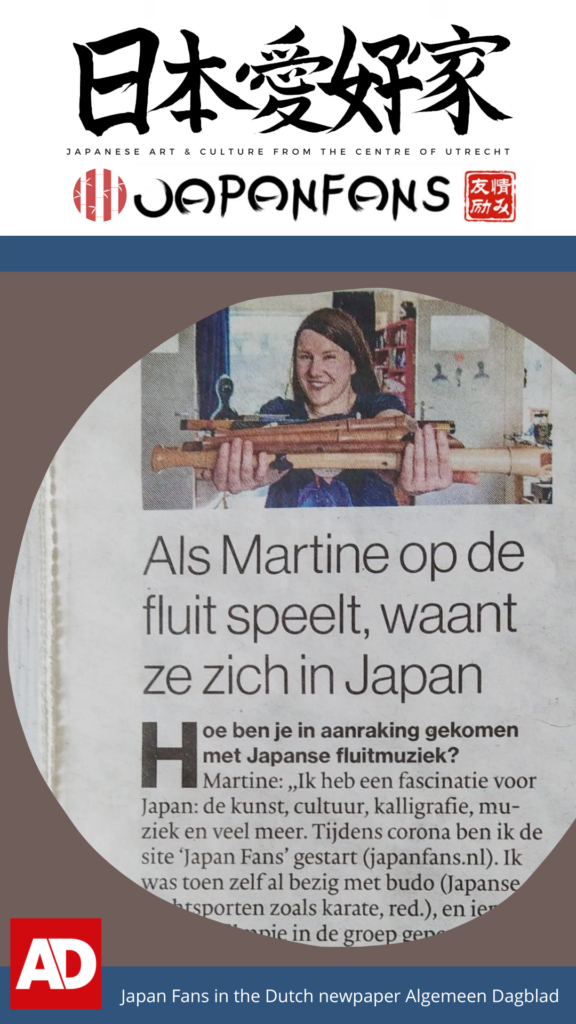As a result of the concerts with Japanese flute music, which Japan Fans Utrecht organised at CAMERA JAPAN festival and the Manga and Japanese Culture Week, among others, founder Martine was interviewed by Simone Langejan for the national daily paper Algemeen Dagblad. An English translation can be found below, with many thanks to Hans.
Japan Fans in Dutch newspaper Algemeen Dagblad
Almost everyone has a hobby. And always with a story. Martine Mussies, a researcher at Utrecht University, has over forty different flutes on which she plays Japanese music. Each flute has its own story, as if they were all friends of mine”.
How did you come into contact with Japanese flute music?
Martine: ,,I am fascinated by Japan: its art, culture, calligraphy, music and much more. During corona, I started the “Japan Fans” (www.japanfans.nl). At the time, I was already involved in budo (Japanese martial arts such as karate, ed.), and someone had posted a short film in the group of a sword form with music playing. That is remarkable, because usually martial arts in Japan are performed in silence. Those sounds touched me enormously and I immediately wanted to know all about it. It turned out to be Japanese “shakuhachi” flute music. I already played the flute and then I started to learn this music.”
What do you like about it?
,,What is striking about Japanese music is its stillness, its effects and sounds. The music plays with the idea of imperfection, which make every piece different. In some of the modern Japanese pieces I play, for example, I have to turn up the volume on a high note so that it skips, “squeaks”, which is a “mistake” in classical music. I have a different flute for each piece of music. I have over forty of them and can play them all.”
Isn’t it difficult to choose from forty flutes?
Every wind instrument is unique, with a certain sound that suits a certain atmosphere. I have a few small flutes, for example, but also a bass recorder that is a metre long. And an electric flute that I combine with electronic sounds from Japanese computer games. That variety makes it fun. Every flute has its own story, as if they were all friends of mine. I like to experiment with different flutes for each piece of music. Then I write down how they sound. And then I choose one that fits the mood and the song. Some of the composers who have written music for me have a clear preference, but mostly I get to decide.”
Can you also read Japanese music scores?
,,I can read some forms of Japanese notation, but it is still very slow! I often write out manuscripts or recordings in Western annotation first, and then practise with that. I also learn a lot by watching videos on the internet or buying records. I then play this music. Eventually I hope to make an album and share it with other fans. But until that moment comes, I continue to practice hard.”

If you like this post, you can share it with the image above (e.g. on Pinterest).
